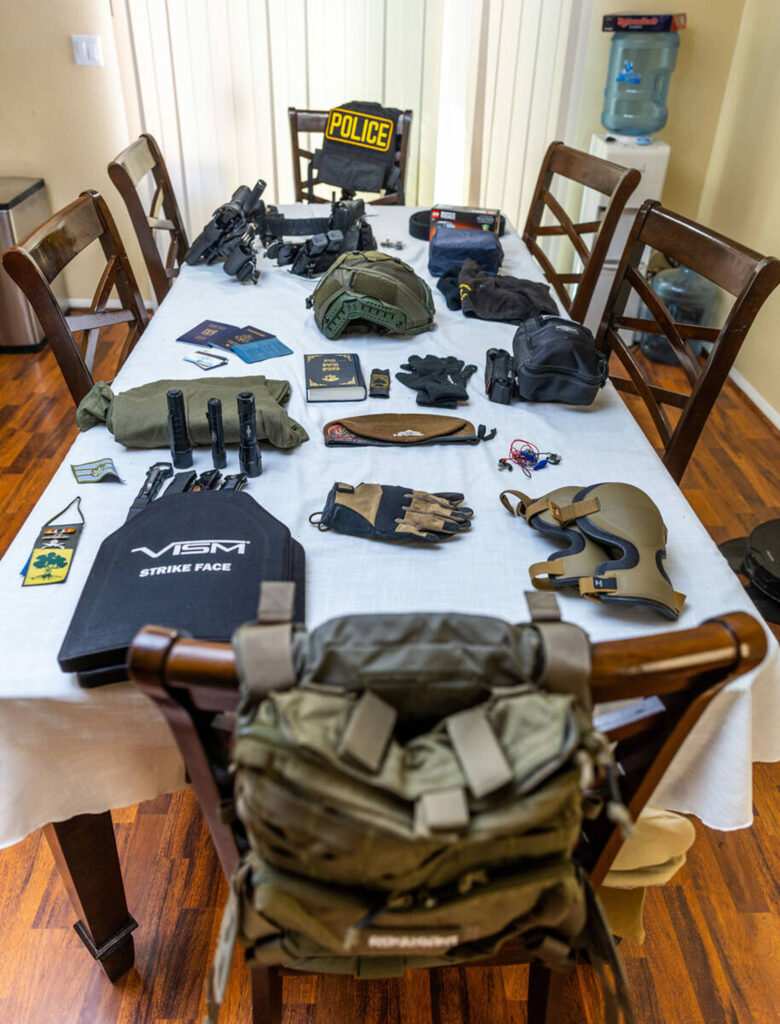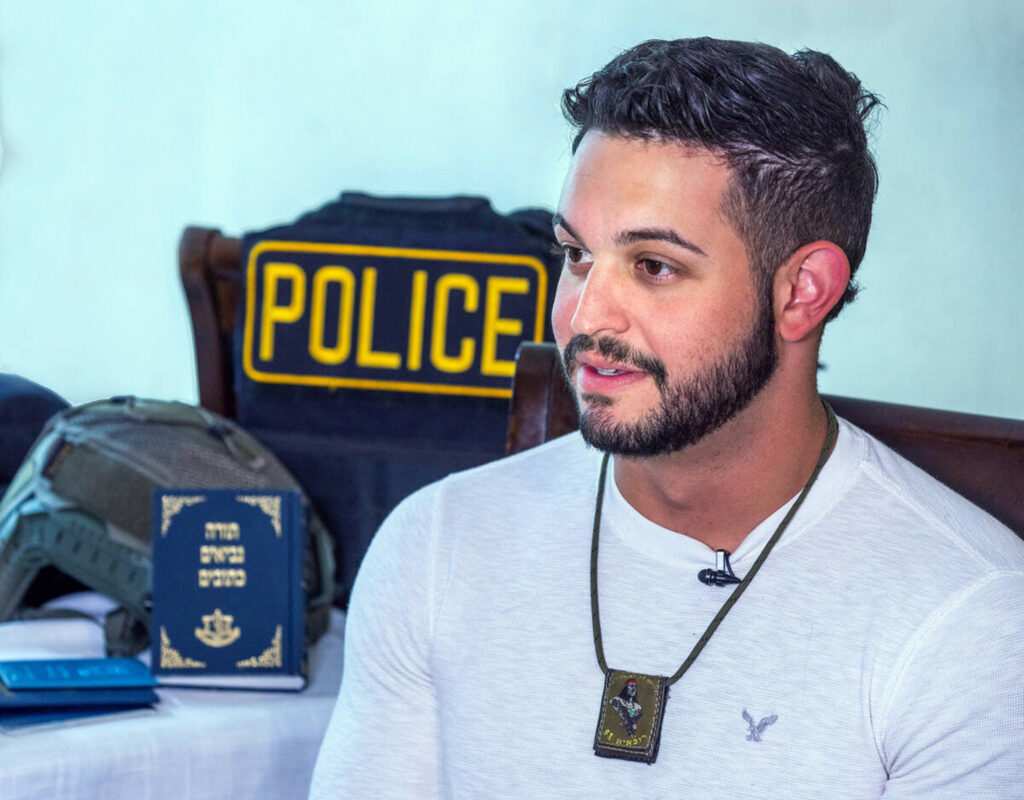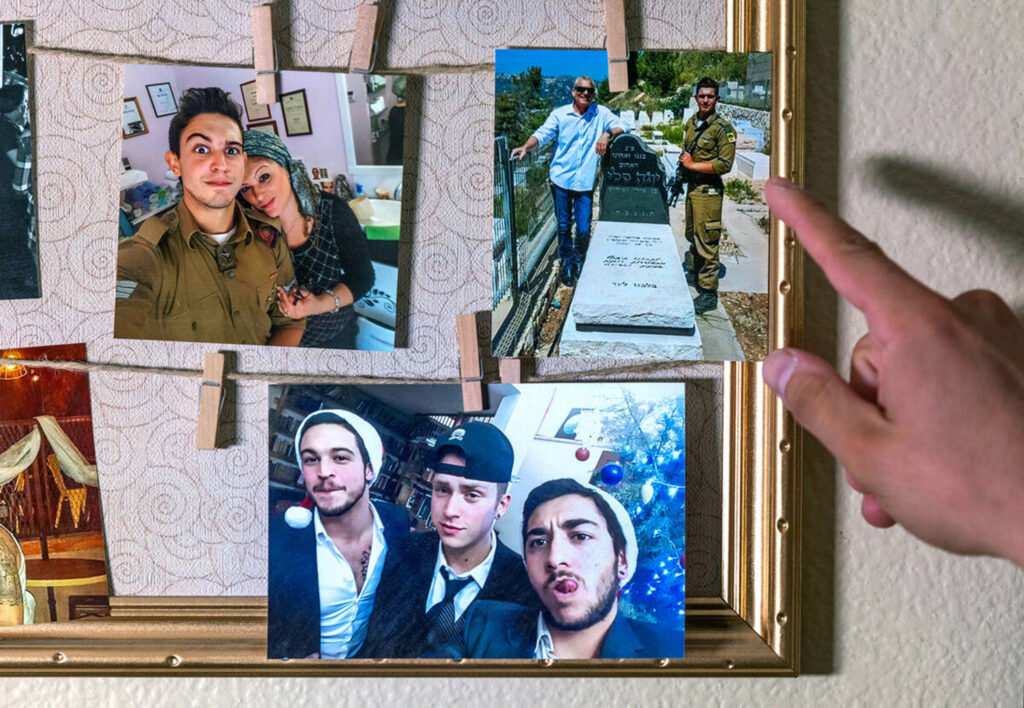The kitchen table is set for war.
Next to the bowl of Halloween candy, battle gear is arrayed — knives, handguns, body armor — encircling all the M&Ms and Snickers.
A soldier’s preparations are underway.
Ariel Salley picks up a Hebrew Bible, holds it the way you would a child’s hand, with care.
“This one’s important to me — it goes with me at work,” the Las Vegas Metropolitan Police Department officer says from his dining room on a Friday afternoon, standing near a wall-mounted sign that reads “Duty, Honor, Courage.” “I received this when I first swore into the military.”

He points to an emblem on its cover of a sword wrapped in an olive branch inside a Star of David.
“This is the IDF symbol right here.”
IDF stands for Israel Defense Forces.
In 2009, Salley, a Las Vegas native, relocated to Israel, where his mother and father were born, completing high school abroad in order to join the IDF as soon as he could.
He eventually became a sniper, serving in Operation Protective Edge, the 2014 war in Gaza.
Remaining a reservist in the IDF, Salley returned to his hometown in 2017, joining the LVMPD a few years later, his mother remaining in her native country.
On Oct. 6, Salley was working First Friday, patrolling the monthly arts gathering downtown.
He was in good spirits; his birthday was on Saturday, and he had just returned home from visiting family in Israel the previous day.

And then his phone began blowing up.
During a water break, he checked to see what was up.
Israel was under attack.
“I could see all the text messages from my mom saying, ‘Hey, missiles are falling. They’re falling pretty close to the house. The house is shaking,’ ” Salley remembers. “ ‘We’re OK, we’re in the bomb shelter, but just want to let you know.’ ”
At 6:30 a.m. Saturday, Oct. 7 — which was 8:30 p.m. the previous night in Las Vegas time — Hamas terrorists began firing over 2,000 rockets into Israel, including the heart of the country, targeting cities like Tel Aviv and Jerusalem, not far from where his mother lives.
The location of the strikes especially startled Salley.
“Once I started realizing that these missiles were going to the center of Israel, I realized, ‘OK, something big is coming,’ ” he says.

His instincts proved horrifically prescient: Hamas soon launched a barbaric terrorist assault massacring Jewish civilians.
Salley contacted the IDF the next day, asking them if he was needed to help defend the country.
The response was swift.
“Immediately, without hesitation, ‘Yes, you have emergency orders,’ ” Salley recalls. “ ‘Soldier, return.’ ”
A death, a new dream
It was family tragedy that begat a soldier.
Ariel Salley is looking at a photo on his living room wall, a picture of him in military uniform, standing with his father next to a grave.
The grave belongs to his brother.
In 2006, Salley lost his older sibling, Yoni Salley, to drug addiction.
It was Yoni’s goal in life to join the IDF, which he was in the process of doing at the time of his death.
It was a family tradition, his father and both grandfathers having also served.
Upon Yoni’s passing, it became Ariel’s goal as well.
“It was at that moment that I realized I want to join the Israeli military,” Salley says. “I’m going to complete the dream that my brother had, which essentially became my dream thereafter.”
Salley realized that dream and then some.
He earned his way to the Golani Brigade, a unit known for its prowess in heavy combat.
“They know that when we are put in, it’s go time,” Salley says.
He gestures toward a brown beret on the kitchen table, a signature of said brigade.
Earning the right to wear one does not come easy.
“I had to walk 80 kilometers in 16 hours, which is approximately 50 miles, in order to receive that one beret,” he says. “Never have I wanted to give up more, have I wanted to say, ‘I quit.’ But we pushed through. And we made it.”
In 2014, he was on the front lines of Operation Protective Edge, the last major conflict in the Gaza Strip, fighting for two months, helping destroy the “terror tunnels” that Hamas had made beneath Gaza.
When Salley returned to Vegas three years later, it was all but a given for him to join the LVMPD one day.
“It was important for me to come back and essentially be there for people, the way my brother didn’t have,” he explains. “I’m not saying that law enforcement did not provide my brother with an opportunity or any help of that sort — my brother just didn’t have long enough of a time to receive that help.
“It was a one-and-done for him,” he continues. “He was addicted to OxyContin for a very short period of time before he lost his life. So I wanted to be here to try to nip that, and go out there and help people. That’s what I wanted to do. That’s why I came back.”
Joining the fight
His mother was against it at first.
You protect the Jews in America. Stay there. Stay safe.
Salley’s a self-professed mama’s boy, and his relationship with his mom is tight, unyielding.
When his brother died, Salley’s parents divorced, and he mostly lived with his mom, forging a powerful bond.
“I can proudly say that she’s my best friend,” he notes.
Salley’s a tough guy — see that bit about him humping gear for over half a day straight — and built like a boulder, but when he recollects breaking the news to his mom that he was rejoining the IDF, he visibly softens.
“When I told her, ‘I’m coming home to fight,’ it was hard. It was very hard,” Salley acknowledges. “Her initial statements were, ‘Please stay there. Please don’t come.’
“And it quickly transitioned to, ‘Mom, I’m coming,’ ” he continues. “We can either help each other, or I’ll do this on my own.’ She quickly understood where my heart, where my mind was at.”
Early Sunday morning, Salley will board a plane to eventually land in Tel Aviv, making the 7,300-mile trip to join his fellow soldiers in a fight for their country.
It’s a one-way ticket; Salley doesn’t know how long he’ll be gone.
He’ll be leaving plenty behind: his girlfriend, his beloved pitbull, his fellow police officers who have given him their blessing, having thrown him a going-away party the previous night.
They can relate to where Salley’s coming from.
“As a police officer, you are in danger,” he says. “You have to have your head on a swivel. You don’t know if you’re coming home at the end of the day.
“All for what?” he asks. “For the love of our country, for the love of our city, our community, our people. That’s why we do what we do. So they wouldn’t question it. They understand it better than anyone else, that this is what needs to be done.”
But why is it so important to him to do so?
Why does Salley feel so compelled to leave a life — a good life, a fulfilling one — that he might not ever be able to return to by putting himself in the throes of war?
Because, as he explains it, an attack on Israel isn’t just an attack on a country, it’s an attack on an identity. His identity.
“Judaism — although it is a religion — it’s not just a religion. It’s a sense of who you are. It’s a characteristic,” Salley says. “We have been enslaved. We’ve been involved in genocide. You look at right now, where Hamas leaders are saying, ‘Kill every Jew,’ simply because of who we are. As a Jew, you’re born with this.
“You have many Muslim countries out there; you have Christian countries — we only have one Jewish country,” he continues. “And that’s Israel. And that’s home. I am a proud American. And I love the United States. But Israel is also my home.”
___
© 2023 Las Vegas Review-Journal
Distributed by Tribune Content Agency, LLC.



